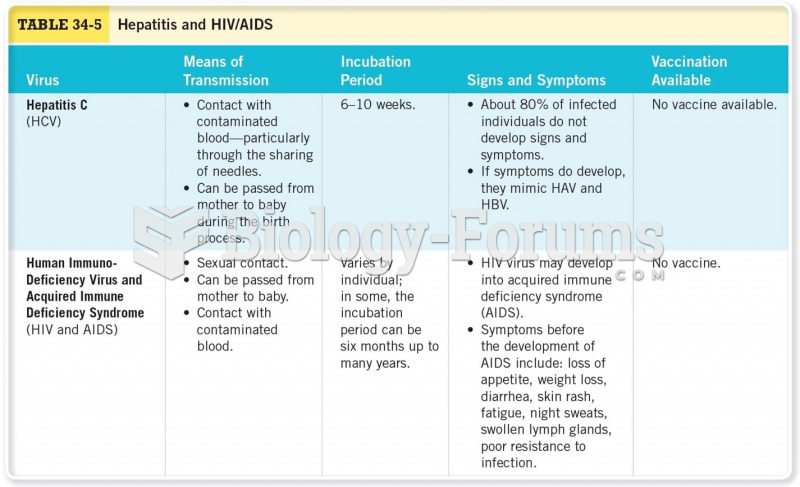Answer to Question 1
Correct Answer: 4
Rationale 1: Water is incorrect because hepatitis A is transmitted through food and water contaminated by feces.
Rationale 2: Food is incorrect because hepatitis A is transmitted through food and water contaminated by feces.
Rationale 3: Germs is incorrect because germs is a general term encompassing bacteria, viruses, fungi, and protozoa.
Rationale 4: Hepatitis B (HBV) is found in blood and certain body fluids. It is spread when blood or body fluid from an infected person enters the body of a person who is not immune. HBV is spread through having unprotected sex with an infected person, sharing needles or works when shooting drugs, needle sticks or sharps exposures on the job, or from an infected mother to her baby during birth. Exposure to infected blood in any situation can be a risk for transmission.
Global Rationale: Hepatitis B (HBV) is found in blood and certain body fluids. It is spread when blood or body fluid from an infected person enters the body of a person who is not immune. HBV is spread through having unprotected sex with an infected person, sharing needles or works when shooting drugs, needle sticks or sharps exposures on the job, or from an infected mother to her baby during birth. Exposure to infected blood in any situation can be a risk for transmission. Water is incorrect because hepatitis A is transmitted through food and water contaminated by feces. Food is incorrect because hepatitis A is transmitted through food and water contaminated by feces. Germs is incorrect because germs is a general term encompassing bacteria, viruses, fungi, and protozoa.
Answer to Question 2
Correct Answer: 3
Rationale 1: They are critical for survival is incorrect because a client with leukemia has a compromised immune system. Vaccinations are contraindicated for patients with a weakened immune system or who are currently experiencing symptoms such as diarrhea, vomiting, or fever.
Rationale 2: They are the cause of the leukemia is incorrect because a client with leukemia has a compromised immune system. Vaccinations are contraindicated for patients with a weakened immune system or who are currently experiencing symptoms such as diarrhea, vomiting, or fever.
Rationale 3: A client with leukemia has a compromised immune system. Vaccinations are contraindicated for patients with a weakened immune system or who are currently experiencing symptoms such as diarrhea, vomiting, or fever.
Rationale 4: They are too late is incorrect because a client with leukemia has a compromised immune system. Vaccinations are contraindicated for patients with a weakened immune system or who are currently experiencing symptoms such as diarrhea, vomiting, or fever.
Global Rationale: A client with leukemia has a compromised immune system. Vaccinations are contraindicated for patients with a weakened immune system or who are currently experiencing symptoms such as diarrhea, vomiting, or fever. They are critical for survival is incorrect because a client with leukemia has a compromised immune system. Vaccinations are contraindicated for patients with a weakened immune system or who are currently experiencing symptoms such as diarrhea, vomiting, or fever. They are the cause of the leukemia is incorrect because a client with leukemia has a compromised immune system. Vaccinations are contraindicated for patients with a weakened immune system or who are currently experiencing symptoms such as diarrhea, vomiting, or fever. They are too late is incorrect because a client with leukemia has a compromised immune system. Vaccinations are contraindicated for patients with a weakened immune system or who are currently experiencing symptoms such as diarrhea, vomiting, or fever.







